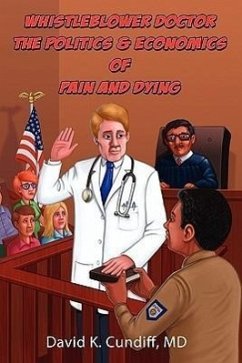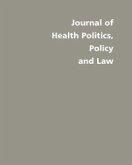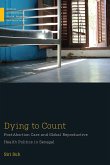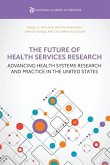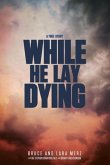This expos, Whistleblower Doctor-The Politics and Economics of Pain and Dying, concerns Dr. David K. Cundiff's efforts over 32 years to improve the quality of palliative care and hospice services for cancer and AIDS patients at the LA County + USC Medical Center. Over a nine year period, he improved the care of terminally ill cancer and AIDS patients at the LA County + USC Medical Center by directing a popular "Pain and Palliative Care Consultation Service." Unfortunately for the financial bottom line of the hospital, better pain and symptom control of terminally ill patients led to more patients at home and fewer patients occupying Medicaid-funded hospital beds. The unintended consequence of Medicaid's dysfunctional hospital-centric funding system was the closure of Dr. Cundiff's Consultation Service in 1995. Dr. Cundiff subsequently blew the whistle by writing 83 incident reports about patients receiving poor pain and symptom management. He also wrote an op-ed piece in the LA Times about poor palliative care and widespread institutionalized inefficiencies due to dysfunctional Medicaid financial incentives rewarding a higher hospital census. The hospital retaliated by firing Dr. Cundiff, and the California Medical Board revoked his medical license, both supposedly over a single clinical treatment decision. In a patient with alcoholism, liver failure, and a deep venous thrombosis (DVT, leg vein clot), Dr. Cundiff stopped anticoagulant medications because of the high risk of serious bleeding. Unfortunately, the patient later died of thromboses in his lungs (pulmonary emboli). This reasonable judgment call was not the real reason the Medical Board revoked Dr. Cundiff's license. He challenged the institutionalized inefficiencies in charity hospitals spawned by Medicaid. In researching the scientific evidence regarding anticoagulant drug treatment of venous thromboembolism (VTE: deep venous thrombosis and pulmonary emboli), Dr. Cundiff serendipitously discovered that these drugs do not reduce the risk of death in these patients. In fact, they increase the chance of dying due to bleeding and rebound hypercoagulability (increased clotting after stopping anticoagulants). Up to 20,000 Americans die unnecessarily each year due to bleeding and rebound clotting from these drugs for prophylaxis and treatment of VTE. While many bleed to death or suffer major nonfatal bleeding, drug companies and medical special interests earn from $17 - $25 billion per year in the U.S. from unnecessary and harmful anticoagulation treatments. Dr. Cundiff's peer-reviewed medical journal publications challenging anticoagulant treatment of VTE have been ignored by drug company funded anticoagulant drug researchers. Federal government health regulators in the FDA and NIH have refused to issue a detailed transparent, public critique of his challenges to the evidence basis of anticoagulation for VTE. Drug company financial clout is killing people.The major goals of this book include: improving the pain and symptom control of cancer and AIDS patients, stopping the epidemic of deaths and injuries from the use of anticoagulant drugs, changing the Medicaid reimbursement system for the LA County Department of Health Services and other places where it fosters inefficiencies and poor medical care, and reinstating Dr. Cundiff's medical license.
Hinweis: Dieser Artikel kann nur an eine deutsche Lieferadresse ausgeliefert werden.
Hinweis: Dieser Artikel kann nur an eine deutsche Lieferadresse ausgeliefert werden.

